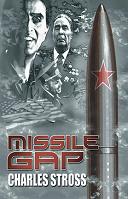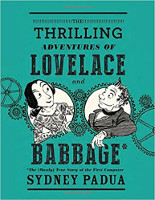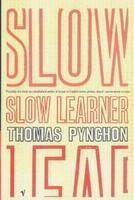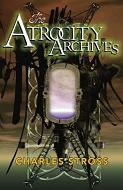 Missile Gap is a short story by Charles Stross, which is available both in Hardback and online. The book plays during the coldest phase of the Cold War (Cuba crisis), but on an earth far removed, in time as well as space, from what we know.
Missile Gap is a short story by Charles Stross, which is available both in Hardback and online. The book plays during the coldest phase of the Cold War (Cuba crisis), but on an earth far removed, in time as well as space, from what we know.
And the 10 million Dollar question is, as always – does humanity have a future? Answers on a post card – if you can find a post office, 100 million light years from home …
Film clip:
An Atlas rocket on the launch pad rises slowly, flames jetting from its tail: it surges past the gantry and disappears into the sky.
Cut to:
A camera mounted in the nose, pointing back along the flank of the rocket. The ground falls behind, blurring into blue distance. Slowly, the sky behind the rocket is turning black: but the land still occupies much of the fisheye view. The first stage engine ring tumbles away, leaving the core engine burning with a pale blue flame: now the outline of the California coastline is recognizable. North America shrinks visibly: eventually another, strange outline swims into view, like a cipher in an alien script. The booster burns out and falls behind, and the tumbling camera catches sunlight glinting off the upper-stage Centaur rocket as its engine ignites, thrusting it higher and faster.
Voice-over:
We cannot escape.
Cut to:
A meteor streaking across the empty blue bowl of the sky; slowing, deploying parachutes.
Voice-over:
In 1962, this rocket would have blasted a two-ton payload all the way into outer space. That was when we lived on a planet that was an oblate sphere. Life on a dinner-plate seems to be different: while the gravitational attraction anywhere on the surface is a constant, we can’t get away from it. In fact, anything we fire straight up will come back down again. Not even a nuclear rocket can escape: according to JPL scientist Dan Alderson, escape from a Magellanic disk would require a speed of over one thousand six hundred miles per second. That is because this disk masses many times more than a star–in fact, it has a mass fifty thousand times greater than our own sun.
What stops it collapsing into a sphere? Nobody knows. Physicists speculate that a fifth force that drove the early expansion of the universe–they call it ‘quintessence’–has been harnessed by the makers of the disk. But the blunt truth is, nobody knows for sure. Nor do we understand how we came here–how, in the blink of an eye, something beyond our comprehension peeled the earth’s continents and oceans like a grape and plated them across this alien disk.
Cut to:
A map. The continents of earth are laid out–Americas at one side, Europe and Asia and Africa to their east. Beyond the Indonesian island chain Australia and New Zealand hang lonely on the edge of an abyss of ocean.
The map pans right: strange new continents swim into view, ragged-edged and huge. A few of them are larger than Asia and Africa combined; most of them are smaller.
[Quoted from the online version of the story.]
So, it’s 1962, the Cold War is at its most intense, and the Cuba Crisis mentality is the predominant thinking pattern, at least in the higher echelons of the American and Soviet governments. There is no space race, not anymore. We cannot escape from the Disc, Yuri Gagarin will, for the foreseeable time (ie until we develop hugely different technology which might change our situation) be the only person, ever, to have left the planet and reached space. Instead of Space exploration we now have Disc exploration – estimates give it the surface area of more than a billion Earths. And so humanity explores, and colonizes. And tries to find out what happened, why, and if there are other people/beings/species on this incredibly huge artefact. The answer could have implications beyond any measure…
The story has several strands – in one we see through the eyes of an American agent called Gregor, as he goes about his business in (Communist controlled) London and in Washington. Another strand follows a couple of colonists (Bob and Maddy)on one of the new, non-Earth continents, as they make their home on this unexplored land, which is so much like earth, except that it isn’t (the local fauna is a strong hint). The third one displays the fortunes of Yuri Gagarin, humanity’s one and only space hero, in his new career as captain of a nuclear-driven Ekranoplan (surface skimming plane) called Sergei Korolev.
The introduction above, btw, is an extract from an intermezzo in the form of an American briefing video/multimedia show which tells a lot of the background story (some more is provided during summaries some of the characters deliver).
We get, understandably, a lot of speculation over why and how humanity and earth was moved (or copied???), how this entrapment works, who the powers above are – and on how to proceed, with humanity set free on this huge disc, but more turned in on itself than ever before.
Technology in the story is straight-forward: Humanity has what it had in 1962, with the nuclear drive, as used on the Ekranoplan and some planes & rockets, being the only real development. The technology of the disc, and the powers that created it are unknown, different from humanity, and entirely incomprehensible. Take this, humanity, and weep.
The story in itself is interesting, logical, and quite unusual, with a rather thought provoking resolution. It starts quite slowly, and looks very ‘run of the mill’ and ‘seen it all before’ (Golden Era SF, anyone? ;-), but picks up drive as you read along, and gets more and more sinister by the page. No, I won’t spoil your enjoyment here. Get the book if you collect Hardback 1st editions (it’s not cheap, sorry), or download the story from Subterranean Press – it’s worth it!
Title: Missile Gap
Author: Charles Stross
Reviewer: Markus
Reviewer URL: http://skating.thierstein.net
Publisher: Subterranean Press
Publisher URL: http://www.subterraneanpress.com/
Publication Date: January 2007
Review Date: 10 May 2007
ISBN: 1596060581
Price: UKP 35 for Hardback
Book URL: http://www.subterraneanpress.com/Merchant2/merchant.mv?Screen=PROD&Product_Code=stross&Category_Code=B&Product_Count=92
Author URL: http://www.antipope.org/charlie/index.html
Pages: 99
Format: Hardback
Topic: SF
Topic: First Contact
More Charles Stross













